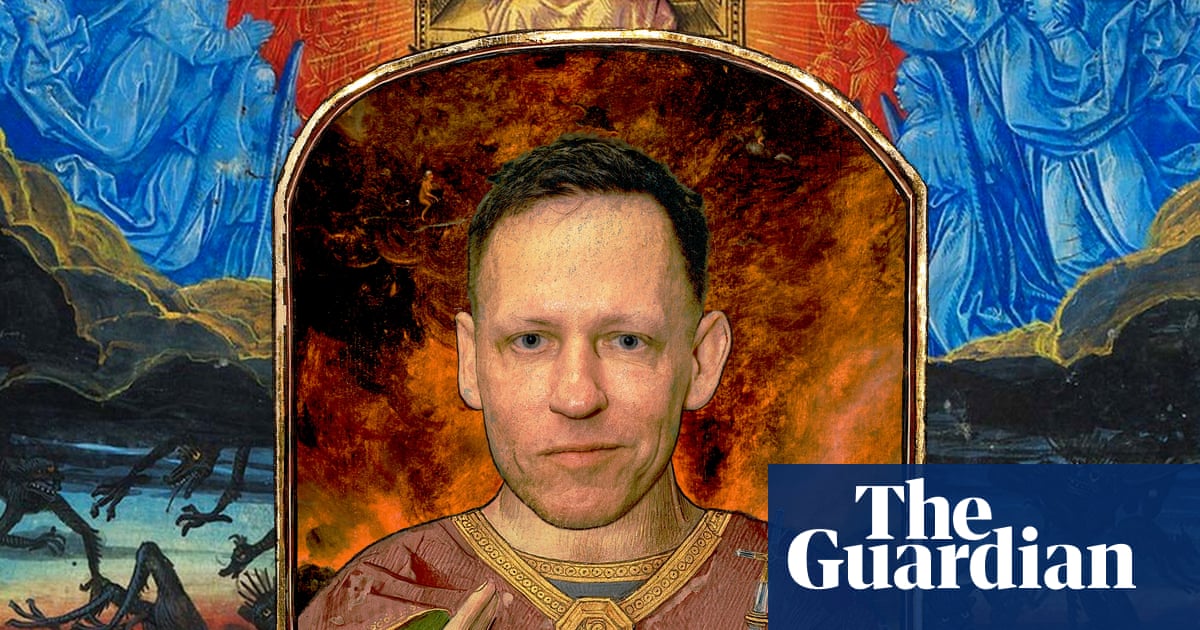Hello, and welcome to TechScape. For the past week, my brain has been marinating in billionaire Peter Thiel’s byzantine musings about the antichrist and Armageddon. At this point, I’m pickled.
Why, you might ask, does it matter what a billionaire thinks about the antichrist? Good question!
To help us understand, my colleagues Johanna Bhuiyan, Dara Kerr and Nick Robins-Early have reported on a series of talks given by billionaire political svengali and tech investor Thiel:
Over the past month, Thiel has hosted four lectures on the downtown waterfront of San Francisco philosophizing about who the antichrist could be and warning that Armageddon is coming. Thiel, who describes himself as a “small-o Orthodox Christian”, believes the harbinger of the end of the world could already be in our midst and that things such as international agencies, environmentalism and Guardrails on technology could hasten its rise. It is a remarkable discourse that reveals the preoccupations of one of the most influential people in Silicon Valley and the US.
Thiel was on the forefront of conservative politics long before the rest of Silicon Valley took a rightward turn with Donald Trump’s second term as president. He’s had close ties to Trump for nearly a decade, is credited with catapulting JD Vance into the office of vice-president, and is bankrolling Republicans’ 2026 midterm campaigns. Making his early fortune as a co-founder of PayPal, he has personally contributed to Facebook as its first outside investor, as well as to SpaceX, OpenAI and more through his investment firm, Founders Fund. Palantir, which he co-founded, has won government contracts worth billions to create software for the Pentagon, US Immigration and Customs Enforcement (Ice) and the NHS in the UK. Now, with more attention and political pull than ever, the billionaire is looking to spread his message about the antichrist, though he is better known for his savvy politics and investments than his contributions to theology.
“I’m a libertarian, or a classical liberal, who deviates in one minor detail, where I’m worried about the antichrist,” Thiel said during his third lecture.
Thiel’s talks … were long and sweeping, mingling biblical passages, recent history and philosophy and sometimes deviating into conspiracy theories. He peppered them with references to video games and TV shows along with musings on JRR Tolkien’s The Lord of the Rings. He likewise recalled conversations with Elon Musk and Benjamin Netanyahu and spoke at length about how he thinks Bill Gates is “a very, very awful person”.
Read more: Inside tech billionaire Peter Thiel’s off-the-record lectures about the antichrist
First, these revelations are so sensational, and that makes it fun to read about. How odd that a man worth some $20bn is giving meandering lectures that make him sound like a confused graduate student.
But that’s not enough to make this a story. Journalists encounter all sorts of strange things that we don’t write about.
When I was neck-deep in editing our story on Thiel’s lectures, which includes large amounts of quoted text, I worried that the Guardian ran the risk of promoting his ideas more so than informing our readers. The line between the two can be thin. Trump reporters have had to walk it for the better part of a decade now.
One reporter who has covered Thiel extensively speculated that the lectures were a way to present himself as a “zany contrarian” as he seeks to raise money. There could be self-interested reasons for lecturing about the antichrist concealed.
Thiel said in one lecture: “It’s a pretty good marketing shtick if you want everybody to hear about something not to let anybody in the room.” This suggests that marking these lectures as off-the-record would draw outsized interest. It’s true that clandestine ideas, by virtue of their ostensible secrecy, attract prurient attention. What happens behind closed doors is more interesting than what’s in public. Were we falling into Thiel’s hands by covering his talks?
Our approach to reporting on this was two-pronged. One story – which I mention and link to above – reports the facts of the talks. Thiel hosted these lectures and said these things. The story quotes him extensively. We included this note in the story: “ is publishing substantial quoted passages alongside contextual annotations so that the public may be informed on what an influential figure in politics and technology was saying behind closed doors.”
The reasoning behind that approach is this: you can read what this wacky billionaire has to say, and you can judge it compelling or lacking. Once informed, you may hold him accountable. Do you feel comfortable that this person has a great deal of sway over your vice-president if you’re in the US or your healthcare system if you’re in the UK?
With Trump, it can be maximally informative to see his words as he said them. Reporting that the president’s words were “shocking” or “unprecedented” without including them can shield the reader from feeling astonishment at what he said, and may even inspire a backlash against a media outlet that comes off as parochial and paternalistic. Let the reader see and let them judge. On the opposite side of the same coin, reprinting the president’s rambling, two-hour speeches in their entirety is not always helpful to readers. It is one function of journalism to ingest, systematize and condense information, so a reporter must listen to the full speech and pick out the most relevant, representative parts. We approached Thiel’s lectures with these lessons from political journalism in mind.
Our second piece on the topic – Peter Thiel’s off-the-record antichrist lectures reveal more about him than Armageddon, which published simultaneously with the first – took a different tack. This essay offered an interpretation of Thiel’s lectures without quoting him extensively, engaging with his ideas on behalf of the reader to decipher the significance of his words. His almost nonsensical interpretation of The Book of Revelation and other texts may be the apparent subject of the lectures, but their real meat – what he truly exposes about himself – is how a very influential person thinks about his power.
In this critique of Thiel’s lectures, the Stanford professor Adrian Daub bushwhacked through the venture capitalist’s “bizarre thicket of his own references and preoccupations”, also known as “the autodidact’s private cosmos”.
In these meandering talks, Thiel is clearly aiming for the kind of syncretic thinking he so relished in the books and lectures of the philosopher and professor René Girard, whom he knew at Stanford University and whose work he has long admired. Unfortunately, more often than not, Thiel ends up with something that reads like Dan Brown.
Overall, the picture of Thiel that emerges in these lectures is someone desperately trying to disidentify from their own power. “You realize,” he tells his audience when interpreting a particular Japanese manga, “in my interpretation … who runs the world is something like the antichrist.” Here’s a man who, together with a couple of fellow Silicon Valley freaks, helped return a sundowning caudillo to a presidency he is obviously unsuited for, and who uses the awesome might of the US government to remake society and the world. A man who funds the companies that harness your data and determine who gets doxxed, deported, drone struck. Who funds far-right movements that seek to remake the very face of liberal democracy.
One is reminded of the scene in Apocalypse Now where Martin Sheen’s character comes across a platoon and asks who’s in charge here. ‘Ain’t you?’ Ain’t you running the world, Peter? If it isn’t you, who is?
Read more: Peter Thiel’s antichrist lectures reveal more about him than armageddon
after newsletter promotion
US tariffs on China threaten electronics supply chains – again
Panic over an AI bubble
Australia’s distaste over social media has spread to Denmark. From my colleague Miranda Bryant: “The Danish prime minister says the country will ban social media for under-15s, as she accused mobile phones and social networks of ‘stealing our children’s ‘childhood’. Mette Frederiksen used her speech on Tuesday at the opening of the Folketing, the Danish parliament, to announce the proposal, in which she said: ‘We have unleashed a monster.’ She added: ‘Never before have so many children and young people suffered from anxiety and depression.’” Frederiksen hopes the ban will take effect next year. The rationale of teen suffering bears echoes of Jonathan Haidt’s panicked bestseller The Anxious Generation, which I found neither persuasive nor compelling.
In November 2024, Australia passed a law requiring social networks to take stringent care not to allow children under 16 to create accounts. The prohibition has been plagued by uncertainty and confusion over age verification, but it is still slated to go into effect on 10 December of this year, much to the chagrin of Meta Platforms, Inc and others.
The legislation’s survival, uncharacteristic of a law that reins in social media companies, has inspired similar bills around the world. Dozens of state governments in the US have now passed laws that require social networks and other websites to verify the ages of their users. Pornography sites have gone dark in many of those states over the demand to determine users’ ages.












